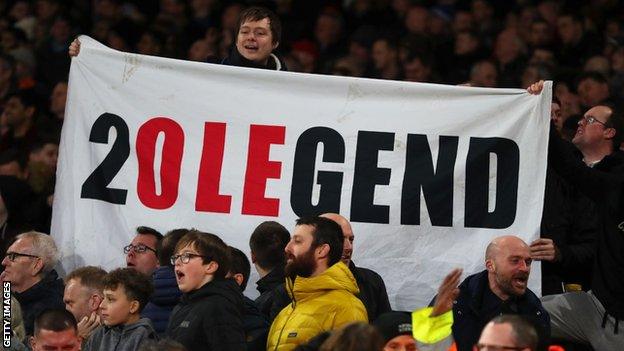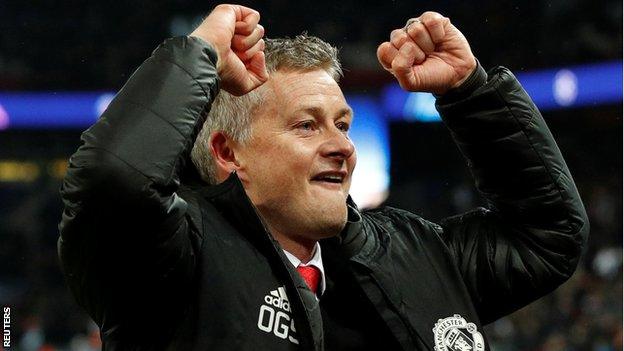Ole Gunnar Solskjaer appointed Man Utd boss, but is it the right decision?
- Published
- comments
It's about putting smiles on people's faces - Solskjaer
Ole Gunnar Solskjaer's coronation as Manchester United's new manager is merely confirmation of the inevitable - but still represents an unlikely line of succession following Jose Mourinho's sacking.
The 46-year-old Norwegian's superb work in reviving Manchester United's top-four hopes in the Premier League and leading them to a Champions League quarter-final with Barcelona after a remarkable comeback against Paris St-Germain positioned him as the only candidate in town.
And yet, for all the bouquets that will now be laid at Solskjaer's feet and as images of a golden future at "The Theatre Of Dreams" are conjured up, this is not an appointment that should simply go unchallenged or unquestioned.
Is Solskjaer the best man for Manchester United in the long term? Or is he just a safe, easy appointment?
Cut through the feel-good factors and those achievements so far - which are considerable and must not be downgraded - and this is a high-risk decision that still contains a large element of the unknown.
It is a gamble. A big one.
Solskjaer is now moving into very different territory as he takes complete control. In managerial terms he is a relative rookie being asked to guide a club that regards itself as the biggest in world football. He knows that as a player and read the script out loud as the caretaker but he is still very short on experience for the scale of job he now takes on.
He has no record as yet of big moves in the transfer market. Of course he has not had the chance but it is still a big unknown how astute Manchester United's new manager is at working in the markets at this level, with the calibre of players involved and the astronomical amounts of money he and United will almost certainly be spending.
These are the risks, the throws of the dice, Manchester United have taken by going for a romantic, populist appointment.
Solskjaer is steeped in Manchester United tradition and has shown a sure touch in handling the unique demands of this sporting superpower, as befits a club legend who scored 126 goals in 11 all-conquering seasons at Old Trafford, including the iconic winner in the 1999 Champions League final.
Few will begrudge this popular, driven character this opportunity to write his name even more indelibly into United folklore - but there is a reality that cannot be escaped.
To suggest Solskjaer was United's planned appointment when Mourinho's acrimonious, divisive time in charge was ended by the meek surrender at Liverpool in December is stretching believability to breaking point.
Solskjaer was the sticking plaster to heal the wounds of Mourinho's era, flown in from Molde to repair a broken club and give Manchester United back to their supporters.
He was the interim anti-Mourinho, the appointment until United could get the man they really wanted, which all wise judges suggested was Tottenham's Mauricio Pochettino.
Solskjaer has performed so well that the names of the likes of Pochettino and even the experienced, decorated Massimiliano Allegri at Juventus faded into the background while he stepped forward.
There is still a school of thought that if Pochettino was United's first choice when Mourinho was dismissed they should have stuck with those instincts and tried everything they could to prise him away from north London.
The Argentine's past few months have not been an easy ride and he has yet to win a trophy at Spurs - but he remains an outstanding manager and is still relatively young at only a year older than Solskjaer.
This is the additional pressure on Solskjaer and executive vice-chairman Ed Woodward now the Norwegian is officially in situ as manager.
They know they will be looked at differently, and even those who have championed Solskjaer may be less forgiving now he is the man deputed to take the club forward permanently.

Solskjaer scored the winning goal for Manchester United in the 1999 Champions League final
This move may yet be the greatest masterstroke of all by Woodward and his fellow powerbrokers at Old Trafford. They are certainly due one after the mess of the post-Sir Alex Ferguson years.
Solskjaer, however, has just been handed a task completely different to the job of removing the poison of Mourinho's time and getting a tune out of players such as Paul Pogba, Anthony Martial and Romelu Lukaku - who appeared drained by the time the Portuguese checked out of the Lowry Hotel.
So much of his best work has been viewed through the prism of Mourinho's bad. Now he is his own man and the pressure is on him.
And this shifts the emphasis for someone who was a failure in his eight-month spell at Cardiff City in 2014 - sacked after relegation and 17th place in the Championship, winning only five of 25 league games.
It may seem unfair, but he will now be judged differently, as permanent managers always are compared to interims.
Manchester United is also very different to Molde, and while many will regard these as the words of a joyless spoilsport raining on Solskjaer's parade, other caretakers who enjoyed the glory have faltered when handed the keys to the kingdom on a full-time basis.
Roberto di Matteo won the FA Cup and Champions League in the space of two months as Chelsea's interim successor to Andre Villas-Boas. Owner Roman Abramovich, against all his instincts, gave him the job permanently - but the following November he was gone.
Maybe United simply discovered Pochettino was an impossible target. Maybe Allegri was never under serious consideration despite his superb work at Juventus and his ability to draw the best from stellar players.
Maybe United simply love everything they have seen from Solskjaer and also know he will not give them the aggravation and grief of a confrontational Mourinho.

Ole Gunnar Solskjaer won his first eight matches after replacing Jose Mourinho at Old Trafford
Solskjaer - and by association Woodward - has everything to prove.
Solskjaer won a reputation as the baby-faced assassin as a player and now he must demonstrate similar ruthlessness in his new role. It was a failing that gobbled up David Moyes from almost his first day at Carrington after Ferguson left the building.
He must prove he can buy and sell adroitly for the sort of huge sums that have never been part of his managerial thinking.
Solskjaer's signings and sales will have his imprint - and consequences both for the club and himself. He will, of course, have the assistance of a technical director.
He must give players bad news as well as good - and the message instantly sounds different when it comes from a permanent manager rather than someone who may simply be passing through.
Solskjaer must ensure those United players who let themselves and the club down so badly during Mourinho's final months do not revert to former bad habits now full managerial stability has been restored. He must make sure the months of upturn become the rule rather than the exception.
This is still a squad that needs huge reshaping and renewal on a scale Solskjaer has never had to contemplate in his managerial career. It is no easy job.
He will also need Woodward to show a much better grasp of the mechanics of the markets than he has since his first transfer window under Moyes, when the Scot arrived in the summer of 2013.
As proved recently, especially in the dismal FA Cup quarter-final loss at Wolves, Solskjaer has taken on a significant task on and off the field which should not be shielded by so many fine performances.
He has done a magnificent job so far but now the real test comes.
There is no guarantee he is a banker as Mourinho's full-time successor and he still has plenty of doubts to erase and questions to answer.
If you are viewing this page on the BBC News app please click here, external to vote.